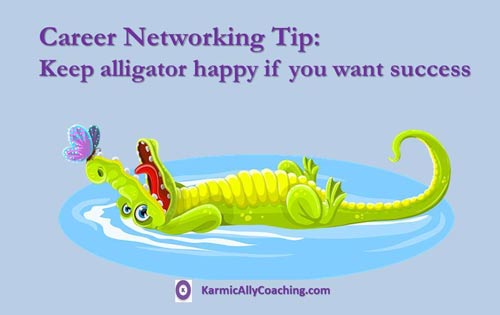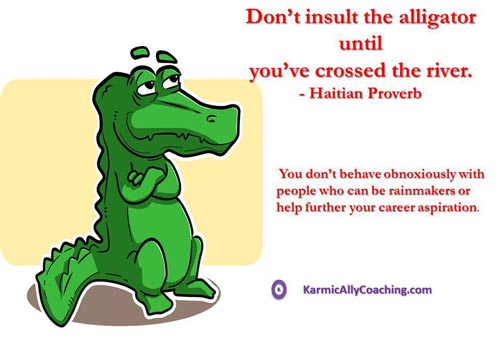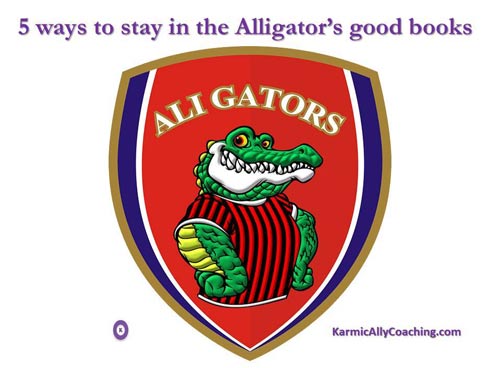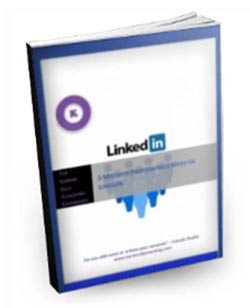
Establishing contact with recruiters, HR personnel and potential rainmakers for job hunting has become easier through LinkedIn because you can connect with the target professional through your 2nd degree connections, Groups and even boiler template invites via the People You May Know section with 3rd degree connections.
The latter are often accepted if the other person’s agenda is to build a wider network or they see merit in your profile.
But (and I mean a really big but), if the invitation isn’t done properly, it also raises the possibility and danger of inadvertently insulting those very professionals who you need to be in your corner to achieve your end goal – an introduction and a chance to get your resume on the right desk and job interview invite.
I’ve written tons of posts about LinkedIn etiquette, as well as a free downloadable ebook 5 Mistakes Professionals Make on LinkedIn that addresses professional conduct when connecting with people whom you don’t know in real life. The same etiquette and good manners that you demonstrate in the offline world is required in online networks.
I’m observing a break in code of conduct especially among the millennial generation. I wish someone would tell them that just because a professional is on LinkedIn doesn’t mean they are open to accepting your invitation or giving you access to their network unless they feel the connection is mutually beneficial.
There’s a Haitian proverb
Don’t insult the alligator until you’ve crossed the river.

I think this proverb applies to the situation.
You don’t behave obnoxiously with people who can be rainmakers or help further your career aspiration.
Here’s a real life example.
Way back in 2009 when I first joined LinkedIn, I received an invite from a young professional whose profile was incomplete, no profile photo and who didn’t respond to my inquiry about how we knew each other. It was a polite request on my part because I meet a lot of people and simply wanted to be reminded. I had no reason to remember him until he resurfaced in a shocking manner.
He started trolling me in an IFRS Group where I had numerous 1st degree connections from the offline professional world.
This person started abusing me instead of providing value to the technical questions that were the topics of discussion.
Then he made the mistake of mentioning my former employer and something very nasty which wasn’t true and provided grounds for defamation and slander against the Troll as well as my former employer for their staff’s conduct.
I did 2 things – reported him to the LinkedIn Group Manager who blocked him and issued a warning to the Group to maintain propriety and secondly, contacted the HR Manager at my previous employers to discuss this person and his so-called connect at the firm.
Imagine my surprise when the Manager told me that there was no such manager in the firm (I had left in 2007 and attrition is high in that company). He took it seriously though and asked me for details of this young professional.
A few months later, the Manager called me to tell me that the person had applied for a job at the company and he had issued a notice that the person was blacklisted and wasn’t to be interviewed because ‘he wasn’t fit to be employed’.
A couple of Group Members including my connections wrote to me personally about how they admired my handling the situation and their own sense of disgust. I emerged a stronger and respected member of the Group.
The difference between Troll and the others is the former didn’t recognize the alligator while the others did.
He made another mistake which can be summed in this Creole Proverb:
Don’t call the alligator “big-mouth” till you have crossed the river
Had the Troll played his cards right, the story would have been different. 1 phone call from me or my forwarding the resume would have helped him at least get noticed in a pile resumes because I had left on good terms to follow my dream.
Troll had caught my eye for all the wrong reasons. A Google search indicated that the same conduct had led him to be debarred by the professional body whose qualification was important for him.
This shouldn’t put you off from making introductions when you can or request introductions but be aware that when you make a request, the other person may do more research on you and an uncomplimentary Google search might mean a dead end to your request.
This brings me to the second tip for effective job hunting.
6 Degrees of Separation: networking with influential alligators
Six degrees of separation is the theory that everyone on Earth is 6 or fewer steps away, by way of introduction, from any other person on Earth, so that a chain of “a friend of a friend” statements can be made to connect any two people in a maximum of six steps.
In fact, it’s the same concept behind the parlor game Six Degrees of Kevin Bacon where a group of players to try to connect any such individual to Kevin Bacon as quickly as possible and in as few links as possible. (Kevin Bacon Trivia: In 2007, Bacon started a charitable organization named SixDegrees.org).
The concept is well explained in this video by Veritasium and I encourage you to watch it in full.
The point is, it can work in your favor or even against you like it did for the Troll where there was a second degree of connection which went terribly wrong in his job search.
5 ways to stay in the Alligator’s good books
The adage “it’s not what you know; it’s who you know” applies to both job hunters and self-employed professionals.

Having the right connections that are able and willing to recommend you is as important as a resume that makes you stand out above the crowd. Make sure you are adhering to the following 5 pointers to make your network viable:
Courtesy is not old fashioned – Manners still Matter
Assume everyone you meet whether in the offline or online world is either an alligator or has the potential to be one for you and needs to be treated with courtesy & respect. You don’t know who they know who might be someone you need to know (remember The Troll).
Even when you are leaving a job that you hated, make sure you part on an amiable note. Potential employers often do reference and background checks or if it is a closed industry, they know each other. You certainly don’t want to be given a verbal reference that is in conflict with a written one.
On the alligator note, here’s another Haitian proverb worth remembering
Only when you have crossed the river, can you say the crocodile has a lump on his snout.
Build your Network before you need it
Make networking a part of your regular professional activity and not something you do when you suddenly need a job. Start building your network of professionals with whom you share common interests, industry and professional backgrounds.
This will not only keep you abreast of industry developments but quite often provide you with an inside tip-off for a potential job.
Many companies offer incentives to their staff for recruitment referrals. You want to top of mind if your contact is in a position to recommend you.
Know Like Trust Factor
Make sure your network really knows you. People like to help out those whom they know, like and trust. If you make a new connection, whether it is offline or on social media, cultivate that connection with useful information and generally get to know them better. That way, if you need help the alligator who is in a position to recommend you would be able to do it with confidence and you’ll avoid the disappointment of a no response.
Exercise your Gratitude Muscle
Remember to always thank your connection for leads whether they work out or not. Acknowledgement of their stepping out to help you ensures they will do it again if required.
Become the Alligator!
Networking is a 2 way street. Just as you may need an alligator to help you achieve your goals, avail every opportunity to be a rainmaker alligator to someone who needs your assistance or recommendation.
It demonstrates your prowess as a well-connected professional. Helping others often results in help when we need it. The Universe always makes sure that assistance given is returned even if it isn’t by the same person.
Have you ever experienced the 6 degrees of separation in your job hunt or in setting up your business? What about the alligators? Ever experienced the wrath of an angry alligator?
PS. Do you understand the dynamics and purpose of this professional networking platform?
I invite you to check out 5 Mistakes Professionals make on LinkedIn. In this short guide, I’m sharing 5 key mistakes and potential areas where you need to be careful. If you’re making any of these mistakes, you’ll find doable tips to course correct.
Click on the image of the ebook to get download directions and start creating meaningful connections with alligators on LinkedIn.




 I adhere to the Certified Coaches Alliance Code of Ethics and Standards. A copy is available on request.
I adhere to the Certified Coaches Alliance Code of Ethics and Standards. A copy is available on request.
 Let's Talk through the Connect Form:
Let's Talk through the Connect Form: